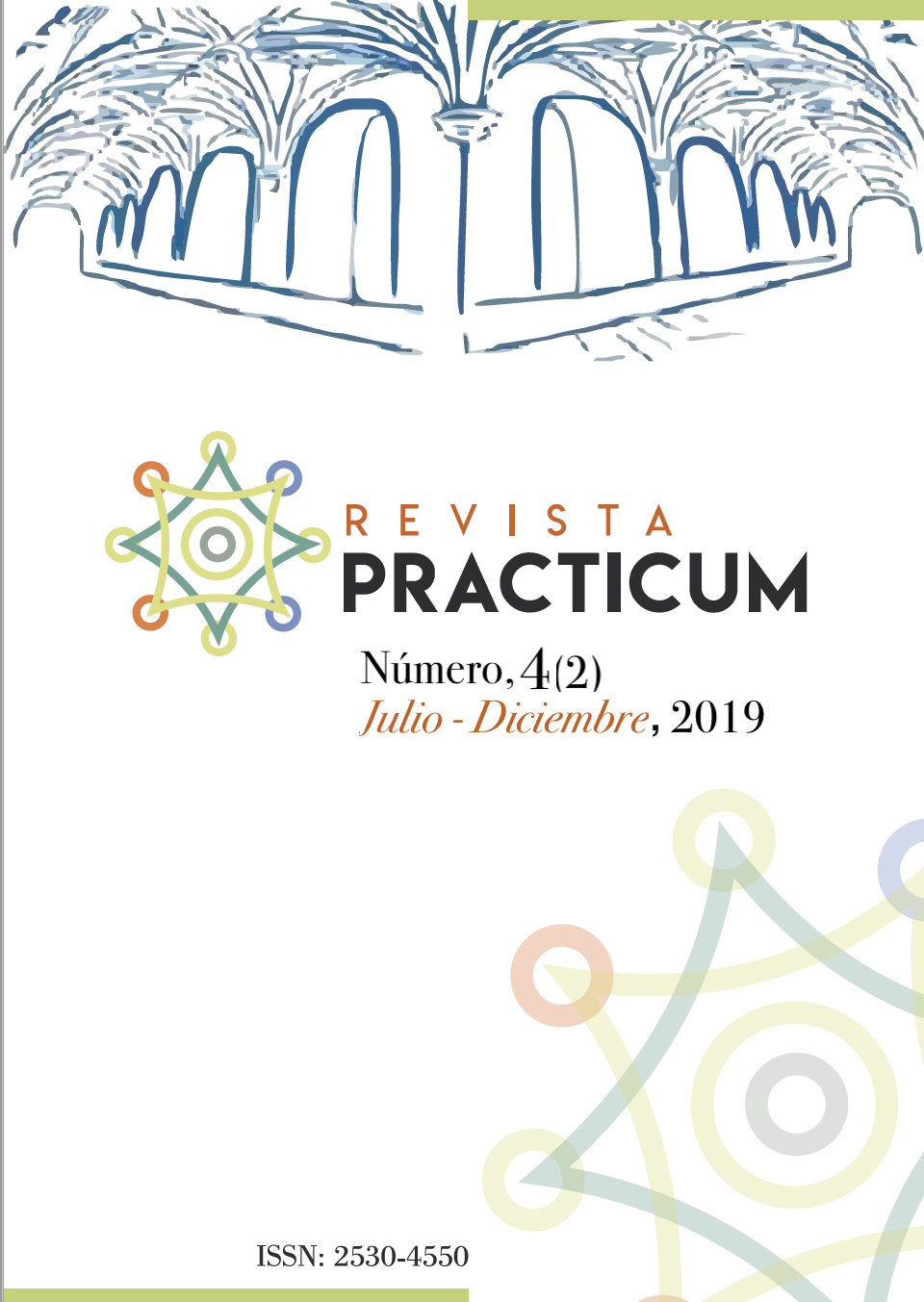Last semester student teachers’ perception on the relationship between theory and practice in their practicum
DOI:
https://doi.org/10.24310/RevPracticumrep.v4i2.7803Keywords:
Initial teacher training, practice teaching, theory-practice relationship, student teachers, practical knowledge.Abstract
Practicum can be a fundamental space in order to improve theory-practice relationship in initial teacher training, when, from a reflective view, it aims to promote construction and re-construction of practical knowledge of student teachers. However, developing this kind of practicum is not easy. This paper analyses how student teachers in their last semester of training perceive actions addressed to connect theory and practice in their practicum. 15 student teachers of a Normal school from Zacatecas, Mexico, participated in the study. Data gathering was conducted through semi-structured interviews and focus group. Results confirm that student teachers perceive difficulties in order to connect theory and practice through their practicum. Two main issues are highlighted. First, the need to improve the processes of tutoring, assistance and feedback both by the students’ mentor teachers and university supervisors. Second, the influence of the criteria and procedures used to assess the student teachers.
Downloads
Metrics
References
Anagnostopoulos, D., Smith, E. R., & Basmadjian, K. G. (2007). Bridging the university-school divide horizontal expertise and the “two-worlds” pitfall. Journal of Teacher Education, 58, 138-152. https://doi.org/10.1177/0022487106297841
Anguera, M.T. (1990). Metodología observacional. En J. Arnau, M. T. Anguera, & J. Gómez (Eds.), Metodología de la investigación en Ciencias del Comportamiento (pp. 125-238). Murcia: Universidad de Murcia.
Brenner, M. (2006). Interviewing in educational research. En J. Green, G. Camilli, & P. Elmore (Eds.), Handbook of Complementary Methods in Education Research (3rd. Ed.) (pp. 357-370). Mahwah, NJ: Erlbaum.
Carlson, H. L. (1999). From practice to theory: A social constructivist approach to teacher education. Teachers and Teaching: Theory and Practice, 5, 203–218. https://doi.org/10.1080/1354060990050205
Cho, J. Y., & Lee, E-H. (2014). Reducing confusion about grounded theory and qualitative content analysis: Similarities and differences. The Qualitative Report, 19 (64), 1-20. http://www.nova.edu/ssss/QR/QR19/cho64.pdf
Clarà, M. (2015). What is reflection? Looking for clarity in an ambiguous notion. Journal of Teacher Education, 66, 261-271. https://doi.org/10.1177/0022487114552028
Clarà, M., & Mauri, T. (2010). El conocimiento práctico: cuatro conceptualizaciones constructivistas de las relaciones entre conocimiento teórico y práctica educativa. Infancia y Aprendizaje, 33, 131-141. https://doi.org/10.1174/021037010791114625 Colén, M, T., & Castro, L., (2017). El desarrollo de la relación teoría y práctica en el grado de maestro en educación primaria. Profesorado. Revista de currículum y formación de profesorado, 21, 59-79. https://recyt.fecyt.es/index.php/profesorado/article/view/58048
Creswell, J. W. (2007). Qualitative Inquiry & Research Design. Choosing Among Five Approaches. Thousand Oaks, CA: Sage. Creswell, J. W. (2014). Research Design: qualitative, quantitative and mixed methods approaches (4th. Ed.). Thousand Oaks, CA: Sage.
Elo, S, & Kyngäs, H. (2008). The qualitative content analysis process. Journal of Advances in Nursery, 62, 107–115. http://dx.doi.org/10.1111/j.1365-2648.2007.04569.x
Erickson, F. (1989). Métodos cualitativos de investigación sobre la enseñanza. En M. C. Wittrock (Ed.), La investigación de la enseñanza II. Métodos cualitativos y de observación (pp. 203-247). Barcelona: Paidós.
Iglesias, M. J., Moncho, M, & Lozano, I. (2019). Repensando la formación teórica a través del prácticum: experiencias de una docente novel. Contextos Educativos, 23, 49-64. https://doi.org/10.18172/con.3557
Korthagen, F. A. J. (2001). Linking Practice and Theory: the Pedagogy of Realistic Teacher Education. Paper presented at the Annual Meeting of the American Educational Research Association. http://citeseerx.ist.psu.edu/viewdoc/download?doi=10.1.1.92.1562&rep=rep1&type=pdf
Korthagen, F. A. J. (2010). How teacher education can make a difference. Journal of Education for Teaching, 36, 407–423. https://doi.org/10.1080/02607476.2010.513854
Martín, E., & Cervi, J. (2006). Modelos de forrmación docente para el cambio de concepciones en los profesores. En J. I. Pozo, N. Scheuer, M. P. Pérez Echevarría, M. Mateos, E. Martín, & M. de la Cruz, (Eds.), Nuevas formas de pensar la enseñanza y el aprendizaje. Las concepciones de profesores y alumnos (pp. 419-434). Barcelona: Graó.
Mauri, T., Onrubia, J., Colomina, R., & Clarà, M. (2019). Sharing initial teacher education between school and university: participants’ perceptions of their roles and learning. Teachers and Teaching: theory and practice, 25, 469-485. https://doi.org/10.1080/13540602.2019.1601076
Mayring, P. (2014). Qualitative content analysis: theoretical foundation, basic procedures and software solution. https://nbnresolving.org/urn:nbn:de:0168-ssoar-395173
Méndez, L. (2012). El conocimiento situado y los sistemas de actividad. Un modelo teórico para repensar el practicum. Revista de Educación, 359, 629–642. http://www.revistaeducacion.educacion.es/doi/359_155.pdf
Montero, L. (2018). Relaciones entre teoría y práctica en la formación inicial. Percepciones de formadores y estudiantes del Grado de Maestro en Educación primaria. Educatio Siglo XXI, 36 (2), 303- 330. https://doi.org/10.6018/j/333061
Mtika, P., Robson, D., & Fitzpatrick, R. (2014). Joint observation of student teaching and related tripartite dialogue during field experience: Partner perspectives. Teaching and Teacher Education, 39, 66–76. https://doi.org/10.1016/j.tate.2013.12.006
Nili, A., Tate, M., & Johnstone, D. (2017). A Framework and Approach for Analysis of Focus Group Data in Information Systems Research. Communications of the Association for Information Systems, Vol. 40, Article 1. https://doi.org/10.17705/1CAIS.04001
Onrubia, J., Mauri, T., & Colomina, R. (2017). Tutores de escuela y tutores de universidad evaluando colaborativamente en el practicum de maestro. XIV Symposium Internacional sobre el Practicum y las Prácticas Externas. Poio (Pontevedra), 5-7 julio. Onrubia, J., Mauri, T., Colomina, R. M., & Clarà, M. (2016). Una propuesta para la enseñanza de la reflexión conjunta en el prácticum de maestro. Revista del CIDUI, num 3. https://www.cidui.org/revistacidui/index.php/cidui/article/view/939
Onwuegbuzie, A. J., Dickinson, W. B., Leech, N. L., & Zoran, A. G. (2011). Un marco cualitativo para la recolección y análisis de datos en la investigación basada en grupos focales. Paradigmas, 3, 127-157. https://dialnet.unirioja.es/servlet/articulo?codigo=3798215
Saiz, A., & Susinos, T. (2017). Los seminarios colaborativos en un practicum reflexivo de maestros. análisis de una experiencia en la universidad de Cantabria. Perspectiva Educacional, 56, 3-24. http://www.perspectivaeducacional.cl/index.php/peducacional/article/ view/577/246
Schön, D. (1983). The Reflective practitioner: How Professionals Think in Action. New York: Basic Books.
Stake, R. E. (1994). Case studies. En N. K. Denzin, & Y. S. Lincoln (Eds.), Handbook of Qualitative Research (pp. 236-247).
London: Sage. Willig, C. (2013). Introducing qualitative research in psychology. London: McGrawHill.
Yan, Ch., & He, Ch. (2010). Transforming the existint model of teaching practicum: a study of Chinese EFL Student teachers’ perception. Journal of Educational for Teaching, 36, 57-73. https://doi.org/10.1080/02607470903462065
Yin, R.K. (1984). Case Study Research: Design and Methods. Thousand Oaks, CA: Sage.
Zabalza, M.A. (2011). El Practicum en la formación universitaria: estado de la cuestión. Revista de Educación, 354, 21- 43. http://www.revistaeducacion.educacion.es/re354/re354_02.pdf
Zeichner, K. (2010). Nuevas epistemologías en formación del profesorado. Repasando las conexiones entre las asignaturas del campus y las experiencias de prácticas en la formación. Revista Interuniversitaria de Formación Del Profesorado, 68, 123– 149. https://dialnet.unirioja.es/servlet/articulo?codigo=3276054
Zeichner, K., & Tabachnik, B. R. (1981). Are the effects of university teacher education washed out by school experiences? Journal of Teacher Education, 32, 7-11. https://doi.org/10.1177/002248718103200302
Downloads
Published
How to Cite
Issue
Section
License
Acceptance of the work implies that the author grants Revista Prácticum the exclusive rights to reproduce, distribute and sell his or her work worldwide, both in digital and paper formats, CD-ROM, etc.
Likewise, the authors shall grant Revista Prácticum the rights of dissemination, public communication on the Internet and IT networks, data buses, as well as any other portals or electronic devices for online consultation of its contents and extracts, under the conditions of the portal, repositories or databases where the work is stored.
Revista Prácticum allows authors to publish and disseminate their articles and works on their personal websites, research teams, institutional repositories and scientific databases. All this in accordance with the Creative Commons 4.0 License









8.png)








